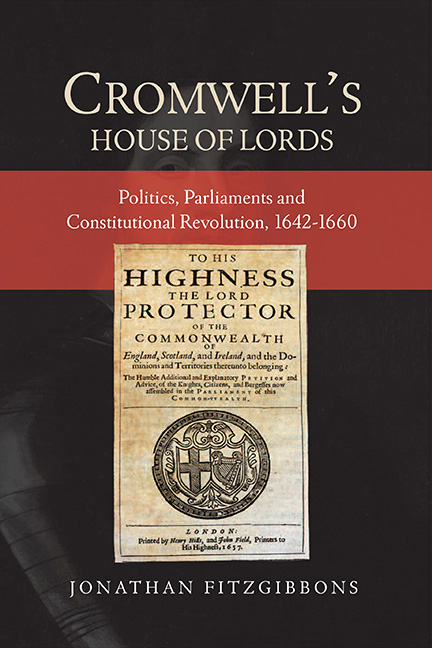Book contents
- Frontmatter
- Contents
- Acknowledgements
- Abbreviations
- Introduction
- 1 Parliamentarian Thought and the Abolition of the House of Lords, 1642–49
- 2 Oliver Cromwell, the Other House and the Humble Petition and Advice
- 3 The Membership of the Other House
- 4 The Other House and the Second Session of the Second Protectorate Parliament
- 5 Richard Cromwell, the Third Protectorate Parliament and the Other House Debates
- 6 The Other House, the Army and the Search for a Settlement
- Conclusion
- Appendix: The Membership of the Other House
- Bibliography
- Index
- Studies in Early Modern Cultural, Political and Social History
4 - The Other House and the Second Session of the Second Protectorate Parliament
Published online by Cambridge University Press: 05 May 2018
- Frontmatter
- Contents
- Acknowledgements
- Abbreviations
- Introduction
- 1 Parliamentarian Thought and the Abolition of the House of Lords, 1642–49
- 2 Oliver Cromwell, the Other House and the Humble Petition and Advice
- 3 The Membership of the Other House
- 4 The Other House and the Second Session of the Second Protectorate Parliament
- 5 Richard Cromwell, the Third Protectorate Parliament and the Other House Debates
- 6 The Other House, the Army and the Search for a Settlement
- Conclusion
- Appendix: The Membership of the Other House
- Bibliography
- Index
- Studies in Early Modern Cultural, Political and Social History
Summary
On the morning of 20 January 1658 the members of the Other House gathered at Westminster for the opening of the second session of the second Protectorate Parliament. After taking their oaths in the Painted Chamber they filed into the former House of Lords and were seated ‘by a herald at armes after the wonted manner there’. The faces of those occupying the benches were new, but the chamber looked much as before. The Council had ordered the Master of the Wardrobe to furnish it with all the familiar items, complete with ‘Wool Packes’. The only material difference was that the arms emblazoned on the great ‘cloth of estate’ of ‘wrought gold’ hanging over the throne at the focal point of the chamber bore the Cromwellian, rather than the Stuart, coat of arms.
Ambassadors and newswriters recognized that the ceremonials mirrored closely a royal opening of parliament. Following Cromwell's arrival at the Other House, ‘formerly call'd the Lord's House’, Black Rod was sent to summon the Commons to attend the Protector. After ‘a little time’, the members of the Commons, led by their Speaker attended by the mace, entered what the newsbooks described as ‘the House of Lords’ and crowded at the bar. The members of the Other House stood and removed their hats as the Protector rose to make an uncharacteristically short speech, which opened by pointedly addressing ‘My Lords, and Gentlemen of the House of Commons’. Claiming to be unwell, Cromwell, in further echo of royal practices, turned to Lord Commissioner of the Great Seal, and Speaker of the Other House, Nathaniel Fiennes, who was ‘richly clad with crimson robes trimmed with gold’, to detail the government's agenda.
Fiennes stressed the importance of upholding the new constitutional arrangement ‘we now stand upon’; by their oaths they were ‘all sworn to it’. He derided those Republicans and Royalists who sought ‘either Utopias of I know not what kind … or daydreams of the return of I know not what Golden age with the old Line’. Instead, Fiennes urged compromise. Given the ‘great variety of humours and judgments’ among the people of the nation, he thought it ‘no wonder’ that ‘every one cannot have what he thinks best in his judgement’; they ought to be ‘content …
- Type
- Chapter
- Information
- Cromwell's House of LordsPolitics, Parliaments and Constitutional Revolution, 1642–1660, pp. 122 - 154Publisher: Boydell & BrewerPrint publication year: 2018



